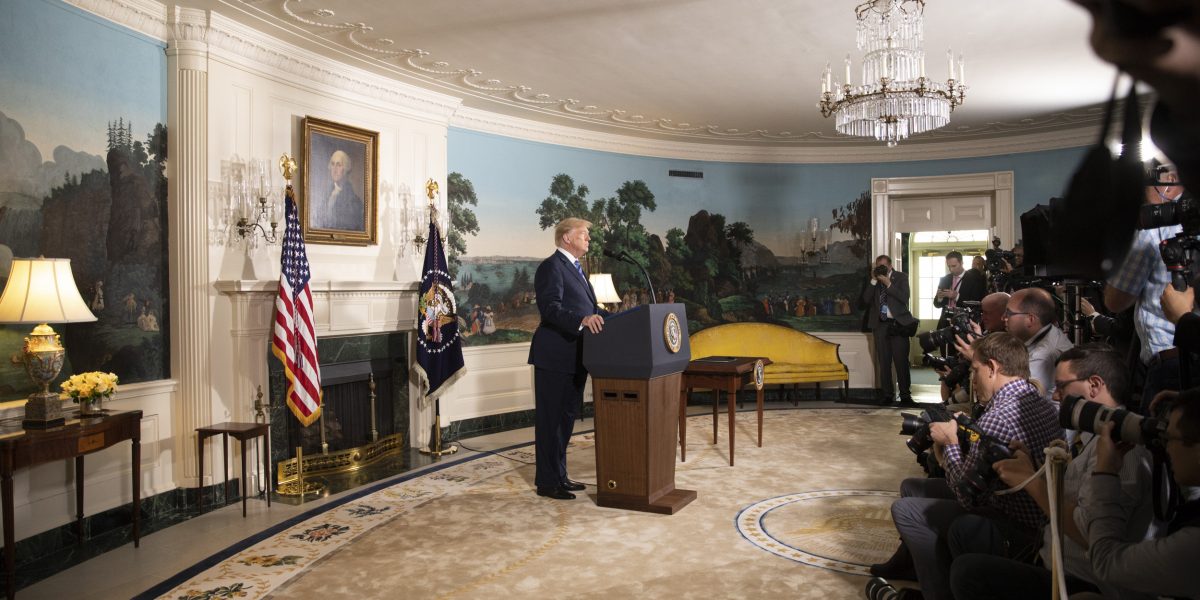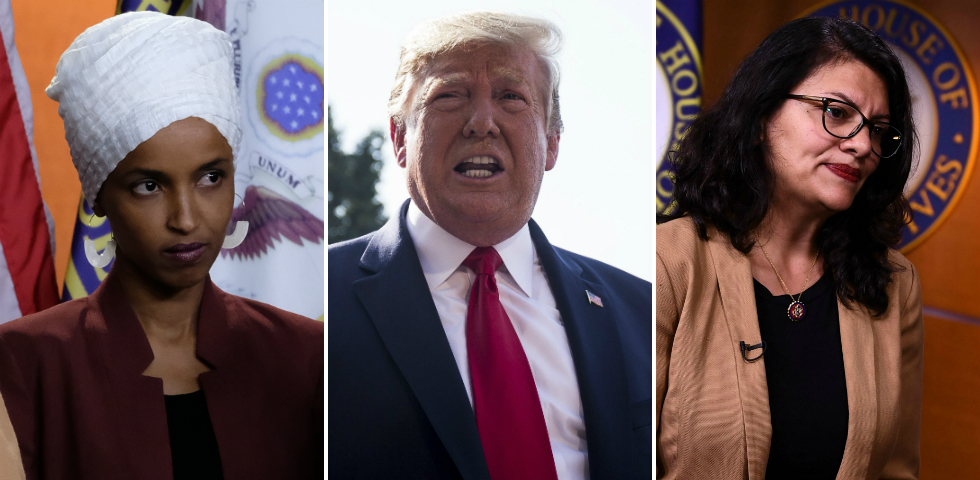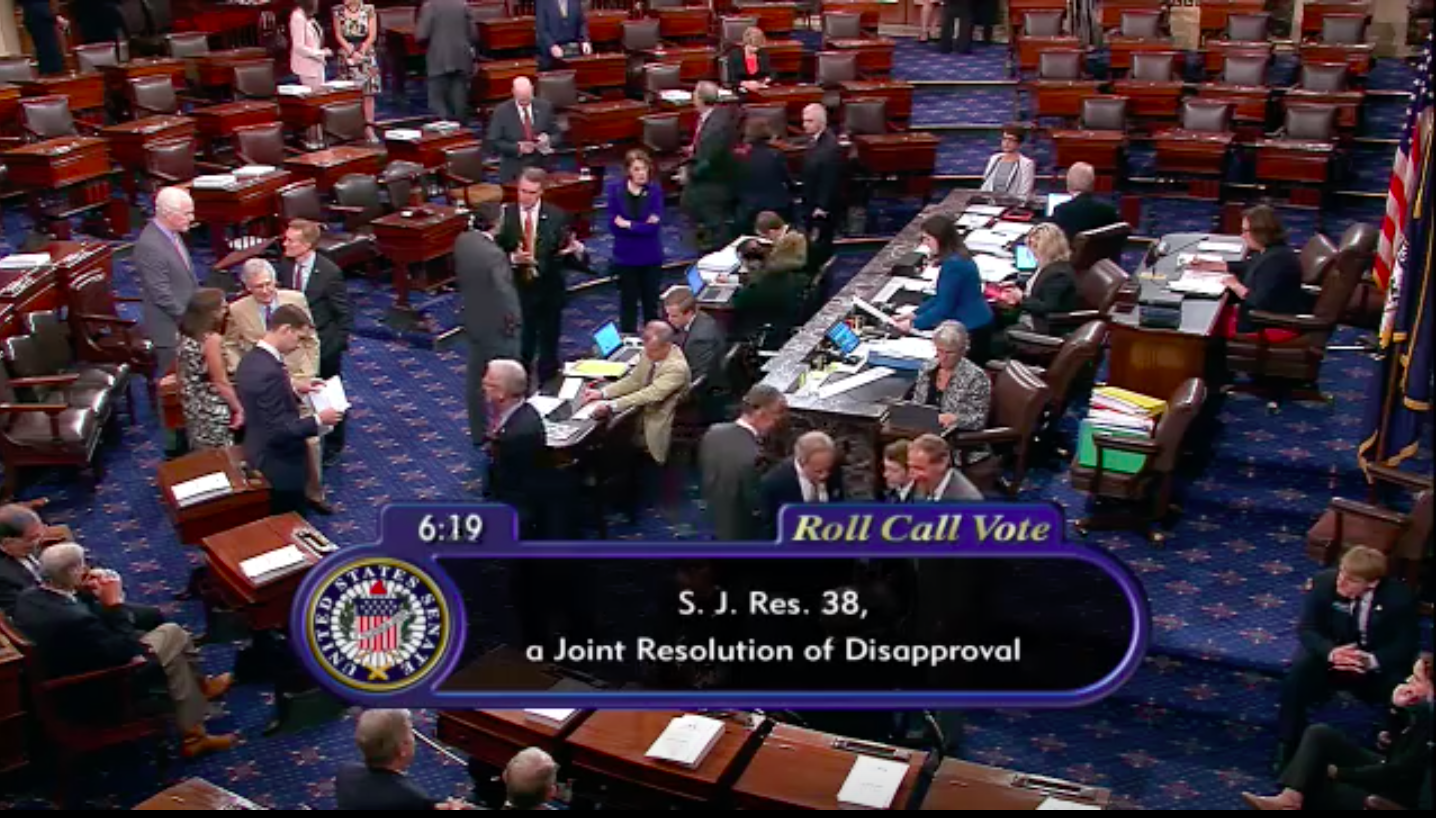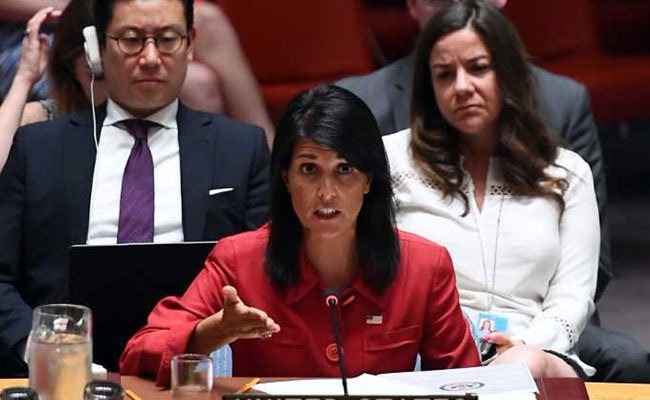Foreign Policy
Trump Announces Withdrawal From Iran Deal To Strong Condemnation From Obama, Kerry
Published
6 years agoon

WASHINGTON, May 8, 2018 — Citing Iran’s President Donald Trump on Tuesday announced the United States’ withdrawal from the Joint Comprehensive Plan of Action — better known as the Iran nuclear deal — over protests from his predecessor and a key member of the previous administration.
“The fact is this was a horrible, one-sided deal that should have never, ever been made,” Trump said during remarks delivered from the Diplomatic Room of the White House. “It didn’t bring calm, it didn’t bring peace, and it never will.
The agreement, which was adopted in October of 2015 and went into effect three months later, requires Tehran to adhere to strict limits and prohibitions on practices and technologies that would enable development of a nuclear weapon, including a regime of inspections by the International Atomic Energy Agency. In exchange, the United States, China, Russia, and the European Union — including signatory nations Germany and the United Kingdom — agreed to lift the economic sanctions that had been leveled against Tehran in recent years as a result of that country’s pursuit of nuclear weapons.
But despite certifications by officials from both the International Atomic Energy Agency and his own government, Trump complained that the limits of the agreement placed on Iran’s use of other nuclear technologies were “very weak,” and that it did not cover what he called Iran’s “other malign behavior,” specifically its involvement in Syria, Yemen, and its support for Hezbollah. The President also condemned the deal for allowing an influx of cash into Iran’s economy, once again referring to the Obama administration’s transfer of approximately $1.7 billion in cash to Iran, which he called “a great embarrassment to me as a citizen and to all citizens of the United States.”
Infamous ‘pallets of cash’ were of Iran’s money, not America’s
Trump has mentioned the $1.7 billion on a number of occasions before and since taking office, and has repeatedly linked the cash transfer to the nuclear deal, citing the fact that the transfer was made in cash form as evidence of some sort of shady deal.
But Trump’s suggestion that the two have ever been connected is completely false. Those funds represent money owed to Iran by the United States for undelivered military equipment. The U.S. incurred the debt after it suspended delivery of such equipment to the newly-declared Islamic Republic of Iran, even though previous Pahlavi government had paid approximately $600 for the equipment before Iran’s 1979 revolution.
While the Carter administration had originally agreed to repay the money, those plans were shelved when Iranian assets were frozen as a result of the 1979 Iran hostage crisis. The unpaid funds remained a source of tension between Washington and Tehran, which filed a claim with the Iran-US Claims Tribunal charged with adjudicating such cases.
The funds were finally returned — with interest — by the Obama administration in order to avoid that tribunal returning an even larger judgment against the United States, and the reason for the cash transfer was that it took place before the deal when Iran did not have access to the international banking system.
A senior State Department official affirmed that one reason for pulling out of the deal was to hurt Iran’s economy, which the official said was largely infiltrated by the Iranian Revolutionary Guard Corps, which the Trump administration recently declared a terrorist organization.
“We do think that, given the IRGC’s penetration of the Iranian economy and Iran’s behavior in the region, as well as its other nefarious activities, that companies should not do business in Iran,” said the official.
Following his remarks, Trump signed a Presidential Memorandum withdrawing the U.S. from the agreement with immediate effect.
Bolton says sanctions to return immediately, denies interest in regime change
As a result, National Security Adviser John Bolton explained that the same sanctions that existed at the time the agreement was signed will go back into effect immediately.
For companies that have been doing business in Iran, Bolton said the Treasury Department would be announcing the specifics of a “wind-down period” during which they would be permitted to wrap up any business they might have. The length of that period would vary depending on the circumstances of the contract, Bolton said.
Bolton added that while the withdrawal from the deal means the U.S. will not be making use of the provisions in U.N. Resolution 2231, the “wind-down period” would follow the pattern suggested by the resolution.
“But the fact of the sanctions coming back in is effective right now,” he said. “We’re out of the deal.”
On the subject of what today’s announcement would mean to North Korea, Bolton said the message Pyongyang should glean from it is that Trump “wants a real deal.” But the notoriously hawkish former ambassador — who once penned a Wall Street Journal op-ed entitled, “To Stop Iran’s Bomb, Bomb Iran,” denied that the Trump administration’s end goal is regime change.
“What the President said was, following his discussion with his counterparts in many European countries…is that one of the fundamental criticisms that the President and others have made to the deal is that it sought to address only a limited aspect of Iran’s unacceptable behavior — certainly a critical aspect — but not taking into account the fact this is, and has been for many years, the central banker of international terrorism. ”
Lifting the sanctions, Bolton said, enabled Iran to increase funding for its military activities across the region. “To really deal with this threat and to try to bring peace and stability to the Middle East, and to relieve the world of the nuclear threat, you have to go after the whole thing,” he explained.
As for specifics, Bolton said that when Secretary of State Mike Pompeo arrives in North Korea for talks in preparation for Trump’s upcoming summit with Kim Jong-un , he will explain that a “real deal” includes “what North Korea itself agreed to going back to the 1992 joint North-South denuclearization declaration: the elimination of both the front and the backend of the nuclear fuel cycle; no uranium enrichment; no plutonium reprocessing.”
America not keeping its word on Iran doesn’t mean it can’t be trusted on North Korea, Bolton says
When asked if Trump’s decision — which some observers have noted might not inspire confidence that he can be trusted to keep his word when he meets with Kim — could be taken as evidence that any deal made by the U.S. might be thrown out when political winds shift, Bolton said that shouldn’t be inferred from Trump’s decision at all.
“The issue here is whether the United States will accept the deal that’s not in its strategic interest,” he said, noting that the U.S. withdrew from the Anti-Ballistic Missile treaty under then-President George W. Bush in 2001 “because the global strategic environment had changed.”
Obama and Kerry weigh in with strong rebukes
But in a rare statement on current events, former President Barack Obama strongly rebuked Bolton and Trump’s reasoning, calling the announcement “misguided” while noting that the JCPOA is in American’s interest because it has “significantly rolled back Iran’s nuclear program.”
The reality is clear. The JCPOA is working – that is a view shared by our European allies, independent experts, and the current U.S. Secretary of Defense,” Obama wrote, noting that the agreement is “a model for what diplomacy can accomplish,” and that leaving the agreement just when there is hope for diplomacy to succeed with North Korea “risks losing a deal that accomplishes – with Iran – the very outcome that we are pursuing with the North Koreans.”
“Walking away from the JCPOA turns our back on America’s closest allies and an agreement that our country’s leading diplomats, scientists, and intelligence professionals negotiated. In a democracy, there will always be changes in policies and priorities from one Administration to the next. But the consistent flouting of agreements that our country is a party to risks eroding America’s credibility, and puts us at odds with the world’s major powers.”
Obama added that without the deal in place, the U.S. “could eventually be left with a losing choice between a nuclear-armed Iran or another war in the Middle East.”
The other figure most closely connected with the deal — former Secretary of State John Kerry — also reacted to Trump’s announcement with a strong statement of condemnation, in which he, too warned that pulling out of the deal means risking a new war in the middle east.
“Today’s announcement weakens our security, breaks America’s word, isolates us from our European allies, puts Israel at greater risk, empowers Iran’s hardliners, and reduces our global leverage to address Tehran’s misbehavior while damaging the ability of future Administrations to make international agreements,” said Kerry. “The facts speak for themselves — Instead of building on unprecedented nonproliferation verification measures, this decision risks throwing them away and dragging the world back to the brink we faced a few years ago.”
An earlier version of this story incorrectly listed the op-ed written by National Security Adviser John Bolton as having appeared in the Wall Street Journal. Bolton’s op-ed appeared in The New York Times. We regret the error.
Andrew Feinberg covers the White House, Capitol Hill, and anywhere else news happens for BeltwayBreakfast.com and BroadbandBreakfast.com. He has reported on policy and politics in the nation's capital since 2007, and his writing has appeared in publications like The Hill, Politico, Communications Daily, Silicon Angle, and Washington Business Journal. He has also appeared on both daytime and prime radio and television news programs on NPR, Sirius-XM, CNN, MSNBC, ABC (Australia), Al Jazeera, NBC Digital, Voice of America, TV Rain (Russia) and CBS News. Andrew wishes he could say he lives in Washington, DC with his dog, but unfortunately, he lives in a no-dogs building in suburban Maryland.

You may like
-


In the Biden Versus Trump Contest, It’s Not the Republican Who is Like Lincoln
-


G7 Leaders Will Coordinate Response To Coronavirus Pandemic
-


Exposed to Quarantined Congressmen, Trump Shrugs Off Coronavirus Test
-


Warren Ends White House Run, Declines To Endorse Biden or Sanders
-


Bloomberg Ends Primary Campaign, Endorses Biden
-


Despite Efforts To Calm Americans’ Fears, Trump’s Coronavirus Approval Drops
Congress
Israel Denies Visas to Omar and Tlaib After Trump Says Allowing Them Would Be ‘Weak’
Published
5 years agoon
August 15, 2019
WASHINGTON, August 15, 2019 — Israeli Prime Minister Benjamin Netanyahu on Thursday appeared to acquiesce to pressure from President Donald Trump to bar two Democratic lawmakers from visiting that country.
Reps. Ilhan Omar, D-Minn., and Rashida Tlaib, D-Mich., had planned to visit the Israeli-controlled West Bank, which has been under Israeli control since 1967 and is home to a number of the latter’s relatives.
But those plans appeared to have gone awry after Netanyahu’s interior minister, Aryeh Deri, announced on Thursday that the pair would not be granted visas to enter the Israeli-controlled West Bank.
In a statement posted to his official Twitter account, Netanyahu said the actual decision to deny Omar and Tlaib admission had been made by Deri, and was necessitated by their status as “leading activists in promoting the legislation of boycotts against Israel in the American Congress.”
“No country in the world respects America and the American Congress more than the State of Israel,” he said.
“As a free and vibrant democracy, Israel is open to critics and criticism with one exception: Israeli law prohibits the entry into Israel of those who call for and work to impose boycotts on Israel, as do other democracies that prohibit the entry of people who seek to harm the country.”
While Israel’s law targeting supporters of the Boycott, Divestment and Sanctions movement has been in effect since 2017, it has never been enforced against American members of Congress.
But the Israeli government’s decision to do so appears to come at the explicit request of President Trump, who was reported last week to have told advisers that Israel should block their entry. Several of Trump’s top aides have close ties to Israeli leaders, including son-in-law and senior adviser Jared Kushner, whose family maintains a close friendship with Netanyahu.
Although it had been unclear in recent days whether the Israeli government would apply its anti-BDS law to visiting American lawmakers, there were early indications that Israel would allow Omar and Tlaib’s visit to go forward.
In a recent statement, Israeli Ambassador to the United States Ron Dermer said that Israel would allow Omar and Tlaib to enter out of respect for Israel’s strong relationship with the United States.
And even after reports emerged that Trump was sending signals that Israel should bar them from entering, it appeared that Israel’s government would heed the advice of several top Democratic lawmakers by allowing the visit to go forward.
But Democrats’ efforts were upended early Thursday after President Trump took to Twitter to encourage Israel to bar the two women.
“It would show great weakness if Israel allowed Rep. Omar and Rep. Tlaib to visit,” Trump tweeted, before adding — without evidence — that the two congresswomen “hate Israel & all Jewish people, [and] there is nothing that can be said or done to change their minds.”
Trump also appeared to suggest that a decision by Israel to bar Omar and Tlaib from entering would help the Republican candidates who will run against them in 2020.
“Minnesota and Michigan will have a hard time putting them back in office. They are a disgrace!” He wrote.
Omar and Tlaib have become frequent targets of Trump’s often-racist attacks since they entered Congress in January of this year.
Last month, Trump tweeted that Omar, Tlaib, and two other congresswomen of color — and American citizens — should “go back” to “their countries” if they disagreed with his policies.
Members of Congress and Jewish groups largely denounced the decision to bar Omar and Tlaib as detrimental to the relationship between the two countries.
In a statement, House Majority Leader Steny Hoyer called the decision “outrageous,” “wrong,” and “contrary to the statement and assurances to me by Israel’s ambassador to the United States that ‘out of respect for the U.S. Congress and the great alliance between Israel and America, we would not deny entry to any Member of Congress into Israel.’”
“That representation was not true,” Hoyer said, adding that he had urged Netanyahu to allow the trip to go forward during a Wednesday phone conversation.
Hoyer said he appreciated Israel’s willingness to allow Tlaib to visit her family in the West Bank on humanitarian grounds, but he “strongly oppose[s]” the “unwarranted and self-destructive” decision to block the visit she’d planned.
While White House Press Secretary Stephanie Grisham told BeltwayBreakfast that Trump’s tweet was not an attempt to advise or encourage any action by Israel, one of Tlaib’s fellow Michiganders — Rep. Justin Amash — appeared to directly link the President’s tweet and Israel’s decision.
“Israel should stand up to President Trump and allow our colleagues to visit,” Amash tweeted. “Nobody has to agree with their opinions, but it will inevitably harm U.S.-Israel relations if members of Congress are banned from the country.”
Also weighing in against the decision was former National Security Council spokesman Ned Price, who called Netanyahu’s acquiescence to President Trump “an affront to elected American lawmakers” and “a slap in the face to the US-Israeli alliance.”
“[Netanyahu] and President Trump together have inflicted great damage on the relationship that won’t be able to be repaired overnight,” Price said.
“There are any number of foreign governments, Israel among them, that have made a risky, short-term investment in President Trump. When the dust settles, I have every expectation they’ll realize that the short-term gains were illusory and the damage to the bilateral relationship will be long-lasting.”
American Jewish organizations also largely condemned the decision as bad for US-Israel relations.
“This reported decision by Prime Minister Netanyahu is dangerous, unacceptable and wrong,” J Street President Jeremy Ben-Ami said in a statement.
“The fact that President Trump has already tweeted out his own call for these representatives to be denied entry illustrates that this decision is motivated purely by politics and ideology — not by the interests of the State of Israel. It is an affront to Congress and the American people and does severe damage to the US-Israel relationship — and it must be reversed immediately.”
American Jewish Committee CEO David Harris said that Israel “did not choose wisely” by reversing its initial decision, which his organization had supported because it was made “out of respect for the fact that both are members of the U.S. Congress, and that Israel rightfully prides itself on being an open, democratic society.”
“While we fully respect Israel’s sovereign right to control entry into the country, a right that every nation employs, and while we are under no illusions about the implacably hostile views of Reps. Omar and Tlaib on Israel-related issues, we nonetheless believe that the costs in the U.S. of barring the entry of two members of Congress may prove even higher than the alternative,” Harris said.
The largest pro-Israel organization in the US, the American Israeli Public Affairs Committee — better known as AIPAC — also weighed in against the decision on its’ Twitter account.
“We disagree with Reps. Omar and Tlaib’s support for the anti-Israel and anti-peace BDS movement, along with Rep. Tlaib’s calls for a one-state solution. We also believe every member of Congress should be able to visit and experience our democratic ally Israel firsthand,” an AIPAC spokesperson tweeted.

WASHINGTON, June 20, 2019 — The Senate on Thursday voted to block the Trump administration from using emergency powers to sell billions of dollars worth of weapons to Saudi Arabia, with a bipartisan majority of senators rejecting President Trump’s declaration of a new national emergency to avoid obtaining Congressional approval for international arms sales.
Thursday’s vote marks the second time this year that Republican senators have joined the Democratic minority to rebuke the administration’s policy towards Saudi Arabia, and reflects a growing anger at Trump’s use of emergency powers to avoid involving Congress in national security decisions and his refusal to punish Saudi Crown Prince Mohammed Bin Salman for ordering the murder of Washington Post columnist Jamal Khashoggi.
Earlier this year both the House and Senate passed a resolution under the War Powers Act in order to end American involvement in Saudi Arabia’s ongoing war in Yemen, only to see it vetoed by President Trump.
The resolution is expected to easily pass the Democratic-led House, but faces an almost-certain veto by the President.
Foreign Policy
Haley Resigns As U.N. Ambassador, Shoots Down 2020 Speculation
Published
6 years agoon
October 9, 2018
WASHINGTON, October 9, 2018 — Ambassador Nikki Haley will “take a break” from public service by resigning from her position as the United States’ top U.N. envoy at the end of the year, President Trump said Tuesday morning.
Haley will be leaving “at the end of the year,” Trump said while sitting alongside her in the Oval Office, citing the former South Carolina governor’s desire to “take a break.”
“You have been very special to me, done an incredible job,” he said while addressing Haley, adding that she has done an “incredible job” and “gets it.”
The sudden announcement came less than an hour after Axios broke the surprise news of her resignation.
Within minutes of the story’s appearance online, Haley was spotted by reporters as she walked into the Oval Office with several aides. But when she appeared alongside Trump shortly after she took pains to thank Trump for allowing her to serve, and called her time representing the U.S. at the United Nations “the honor of a lifetime.”
Trump’s conduct of foreign policy, Haley continued, has caused the United States to be respected again.
“Countries may not like what we do, but they respect what we do,” she said.
While some pundits speculated that the timing was connected to the #MeToo-related drama over now-Justice Brett Kavanaugh’s nomination to the Supreme Court, when he and Haley appeared before cameras, Trump claimed that Haley first approached him six months ago about setting a timetable to depart before the end of the Trump administration’s second year.
Haley is one of two members of the foreign policy team to have served for the entirety of Trump’s time in office. She joined the administration at a time when very few members of the Republican foreign policy establishment wanted to serve the new president, which served him just fine, as most of them had signed open letters criticizing him.
As so-called moderates like former National Security Advisor H.R. McMaster and Secretary of State Rex Tillerson were forced out after clashing with Trump over his disdain for international multilateral agreements like the Iran nuclear deal, Haley remained a fixture and an oasis of stability in an administration that has seen turnover at levels unheard of at this point in a president’s first term.
Even as other establishment-minded administration officials incurred Trump’s wrath for pushing back on his most extreme impulses and saw their own reputations sullied, Haley managed to thrive in her role at the U.N.
Her New York-based post gave her a place in the spotlight and a chance to burnish her foreign policy credentials. It also gave her enough geographic distance from Washington to avoid the contempt Trump developed for the members of his national security team who he saw more regularly.
But that geographic distance also allowed her to put political distance between her and the president at moments when she would break from him in one way or another, including the aftermath of last year’s white nationalist riot in Charlottesville, Virginia.
That distance was most evident on the occasions when she would contradict her boss by sharply criticizing the Russian government, even as he continually dismissed the idea that Russia interfered in the 2016 election as a “Democrat hoax” and attacked the Justice Department investigation into the interference as a “witch hunt.”
Haley’s frequent departures from the Gospel of Trump on those matters has made her the subject of endless rumors, most of which place her on the 2020 Republican primary ballot opposing her soon-to-be former boss. But Haley attempted to put a wet blanket on any such speculation by telling reporters that she’d be campaigning for Trump, not against him.
“No, I’m not running in 2020,” she said.


